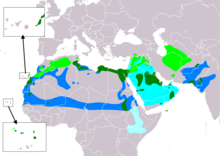Cream-colored courser
| Cream-colored courser | |
|---|---|

| |
| Adult bird photographed in Egypt | |
| Scientific classification | |
| Domain: | Eukaryota |
| Kingdom: | Animalia |
| Phylum: | Chordata |
| Class: | Aves |
| Order: | Charadriiformes |
| Family: | Glareolidae |
| Genus: | Cursorius |
| Species: | C. cursor |
| Binomial name | |
| Cursorius cursor (Latham, 1787) | |

| |
| Range of C. cursor Breeding Resident Non-breeding Passage Probably extinct Possibly Extant (resident) Possibly Extant (non-breeding) | |


The cream-colored courser (Cursorius cursor) is a species of wader in the pratincole and courser family, Glareolidae. Both parts of the scientific name derive from Latin cursor, "runner", from currere, "to run"[2] which describes their usual habit as they hunt their insect prey on the ground in dry open semi-desert regions of the Middle East and northern Africa.
Range
Cream-colored coursers are found in the Canary Islands, Cape Verde, North Africa and Southwest Asia. Their two eggs are laid in a ground scrape. The breeding season extends from February to September,[3] but they may breed also in autumn and winter when local conditions (especially rainfall) are favourable.[4] They are partially migratory, with northern and northwestern birds wintering in India, Arabia and across the southern edge of the Sahara. Some birds also breed in the southern desert regions in northwestern India and Pakistan.[5]
They are rare north of the breeding range, but this species has occurred as far away as Finland, Ireland and Great Britain.[citation needed]
Description
Cream-colored coursers have long legs, long wings, and slightly downcurved bills. The body plumage is sandy in colour, fading to whitish on the lower belly. The upperwing primary feathers and the underwings are black. The crown and nape are grey, and there is a black eyestripe and white supercilium.
In flight, this species resembles a pratincole with its relaxed wingbeats, pointed wings and dark underwings.[citation needed]
Subspecies
There are three subspecies of the cream-colored courser:[6]
- C. c. cursor, (Latham, 1787): Canary Islands, North Africa Arabian Peninsula to Iraq
- C. c. bogolubovi, (Zarudny, 1885): southeast Turkey to Iran, Afghanistan, South Pakistan to northwest India
- C. c. exsul, (Hartert, 1920): Cape Verde Islands
Taxonomic note
Hayman's Shorebirds treats the east African form littoralis as a race of the Somali courser rather than of cream-colored.[7] Some authorities in turn consider the Somali, Burchell's and cream-colored coursers to be conspecific.[citation needed]
References
- ^ BirdLife International (2019) [amended version of 2016 assessment]. "Cursorius cursor". IUCN Red List of Threatened Species. 2019: e.T22735845A155429274. doi:10.2305/IUCN.UK.2016-3.RLTS.T22735845A155429274.en. Retrieved 20 September 2024.
- ^ Jobling, James A (2010). The Helm Dictionary of Scientific Bird Names. London: Christopher Helm. p. 125. ISBN 978-1-4081-2501-4.
- ^ Maclean, G.L. (1996). "Family Glareolidae (coursers and pratincoles)". In Hoyo, Josep del; Elliott, Andrew; Sargatal, Jordi (eds.). Handbook of the Birds of the World. Vol. 3. Barcelona: Lynx Edicions. pp. 364–383. ISBN 978-84-87334-20-7.
- ^ Amezian, M.; Bergier, P.; Qninba, A (2014). "Autumn-winter breeding by Cream-coloured Coursers Cursorius cursor is more common than previously reported" (PDF). Wader Study Group Bulletin. 121 (3): 177–180.
- ^ Rahmani, Asad R.; Manakadan, Ranjit (1989). "Breeding records of Cream-coloured Courser Cursorius cursor cursor (Latham) from India". Journal of the Bombay Natural Historical Society. 86 (3): 447–448 – via Biodiversity Heritage Library.
- ^ Gill, Frank; Donsker, David, eds. (2019). "Sandpipers, snipes, coursers". World Bird List Version 9.2. International Ornithologists' Union. Retrieved 24 June 2019.
- ^ Hayman, Peter; Marchant, John; Prater, Tony (1986). Shorebirds: An Identification Guide. Houghton Mifflin Harcourt. ISBN 0-7099-2034-2.[page needed]
External links
- BirdLife species factsheet for Cursorius cursor
- "Cursorius cursor". Avibase.
- "Cream-colored courser media". Internet Bird Collection.
- Cream-colored courser photo gallery at VIREO (Drexel University)
- Interactive range map of Cursorius cursor at IUCN Red List maps
- Audio recordings of Cream-colored courser on Xeno-canto.

